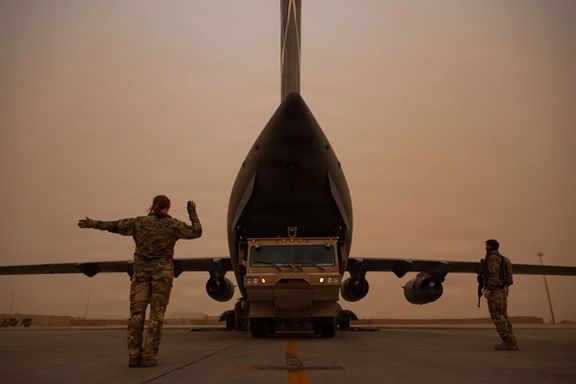US levies secondary sanctions on Iran banking networks
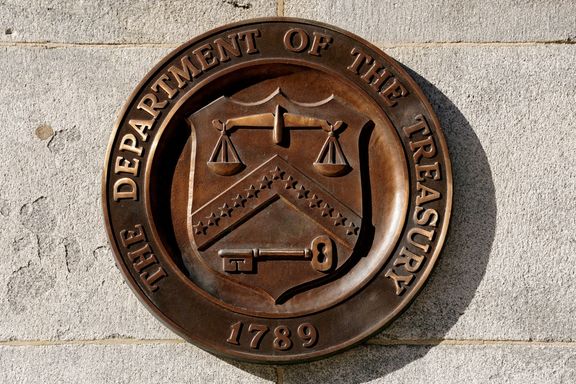
The US Treasury on Wednesday announced a new round of Iran-related sanctions targeting companies from China to the United Arab Emirates over ties to previously sanctioned Iranian firms.

The US Treasury on Wednesday announced a new round of Iran-related sanctions targeting companies from China to the United Arab Emirates over ties to previously sanctioned Iranian firms.
The new measures include 22 entities accused of violating US sanctions on Iran’s Islamic Revolutionary Guard Corps (IRGC), as the Trump administration continues to hit out at sources of revenue for the Iranian state.
“The Iranian regime relies heavily on its shadow banking system to fund its destabilizing nuclear and ballistic missile weapons programs, rather than for the benefit of the Iranian people,” Secretary of the Treasury Scott Bessent send in a statement.
“Treasury remains focused on disrupting this shadowy infrastructure that allows Iran to threaten the United States and our allies in the region,” he added.
The IRGC is designated by the US as Foreign Terrorist Organization. The Quds Force also known as IRGC-QF which is a unit of the IRGC is also designated in the same list.
According to US treasury statement, the IRGC-QF uses front companies outside Iran to secretly move money from oil sales through offshore accounts. These funds, often worth hundreds of millions of dollars, help Iran evade sanctions and support terrorist groups and weapons programs across the Middle East.
The Treasury earlier this month sanctioned an international network accused of smuggling billions of dollars' worth of Iranian oil disguised as originating form Iraq.
Also blacklisted were several vessels allegedly involved in secretly transporting Iranian oil, in the latest US move aimed at Iran’s so-called shadow fleet.
The Trump administration's "maximum pressure" campaign against Iran focuses mostly on the country’s most critical revenue source, oil sales.
All US-linked assets of the targeted entities have been frozen, and Americans are prohibited from conducting business with them. The designations also expose foreign firms to secondary sanctions, raising the cost of facilitating Iran’s oil trade.
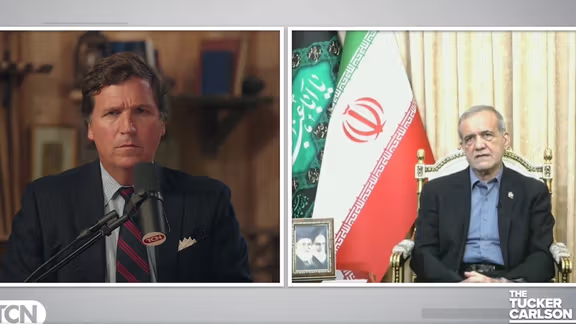
Iranian President Masoud Pezeshkian told US right-wing commentator Tucker Carlson that Israel was seeking to embroil the United States in a Mideast 'forever war', in his first international interview since US and Israeli attacks on Iran.
“Netanyahu, as I said, has his own agenda. He wants to drag the US into forever wars… and to bring more insecurity and unrest to the whole region," Pezeshkian told Carlson in the virtual discussion, referring to the Israeli Prime Minister.
Carlson is an outspoken critic of US military action against Iran and a top dissenter from among President Donald Trump's populist base. The US President dismissed his views as "kooky".
Pezeshkian, a relative moderate, has advocated for greater engagement with Washington but hardline Supreme Leader Ali Khamenei ultimately decides policy.
Responding to a question on whether two senior clerics had issued a fatwa to kill Trump, Pezeshkian said, “To the best of my knowledge, they have not issued decrees or fatwas against any individual or against Donald Trump. It has nothing to do with the Iranian government or the Supreme Leader of Iran."
"What they actually meant by the fatwa was the condemnation of an insult to a religion or religious personalities … It should not be construed or considered as a threat against an individual.”
Last month, Alireza Panahian, a hardline Iranian cleric close to Iran’s Supreme Leader called on Muslims to kill Trump and Netanyahu in response to their threats against Khamenei, citing fatwas that declare him a mohareb, or “enemy of God.”
Najmuddin Tabasi, a member of the Society of Seminary Teachers of Qom, said Trump “must be executed” and warned that “the same hand that fired a shot past his ear can put a bullet through his throat.”
Referring to recent fatwas by Ayatollahs Naser Makarem Shirazi and Hossein Nouri Hamedani, Tabasi said he was confident that “brave youth will deprive Trump of security.”
Pezeshkian also denied Iran had sought to kill Trump in an alleged plot detailed by US law enforcement last year.
'No problem' with reviving talks
Iran has never pursued nuclear weapons, Pezeshkian said, citing religious prohibitions and cooperation with international inspectors.
“We have never been after developing a nuclear bomb—not in the past, not presently or in the future—because this is wrong. And this is in contrast to the religious decree or the fatwa which has been issued by the Supreme Leader … so it is religiously forbidden for us to go after a nuclear bomb.”
Ongoing conflict with Israel had sabotaged nuclear negotiations, he said, adding that talks with the US had been progressing when Israel launched attacks on Iran.
“We were sitting at the negotiating table when it happened. And by doing this, they totally ruined and destroyed diplomacy.”
“We see no problem in reentering the negotiations. But how are we going to trust the United States again? We reentered the negotiations. Then how can we know for sure that in the middle of the talks, the Israeli regime will not be given the permission again to attack us?”
White House envoy Steve Witkoff is planning to meet Iranian Foreign Minister Abbas Araghchi in Oslo next week to relaunch nuclear talks, Axios reported on Thursday, citing two sources familiar with the preparations.
The meeting would mark the first direct engagement since President Trump ordered strikes on Iran’s nuclear facilities last month. Neither side has publicly acknowledged the planned talks.
Alleged Israeli assassination attempt
Pezeshkian said Israel had attempted to assassinate him, describing a strike on a meeting he attended. There was no immediate Israeli or independent corroboration of his claim.
“They did try, yes, and they acted accordingly, but they failed. I am not afraid of sacrificing myself in defense of my country."
Israeli escalation would only deepen regional instability, he warned.
“Will it bring peace and tranquility and stability to the region? It was not the US that was behind the attempt on my life. It was Israel. But as I told you before, it is God who wills when a person will die.”
Pezeshkian framed the conflict as a product of Israeli ambitions and urged Washington to avoid becoming entangled.
“My proposal is that the US administration should refrain from getting involved in a war that is not America’s war. It is Netanyahu’s war that is having its own agenda … an inhuman agenda, and that is having forever wars, wars that go on and on.”
'Death to America' misunderstood
The Iranian president said that “Death to America” slogans were misunderstood. “They don’t mean death to the people of the United States, or even to the officials. They mean death to crime, death to killing and carnage, death to supporting killing others.”
Pezeshkian also said Ali Khamenei has no objection to the operation of US businesses in Iran even under the currency circumstances, and there has never been any limitation from Tehran’s side, attributing barriers to American sanctions.
"The Supreme Leader told me American investors are welcome in Iran. There is no limitation and there's nothing preventing the US investors from coming to Iran to make investments, even presently," he said.
“It is not to be in the interest of the United States to be involved in any kind of war in my region,” he said. “It is up to the United States president to choose … whether to replace war mongering and bloodshed with peace and tranquility.”
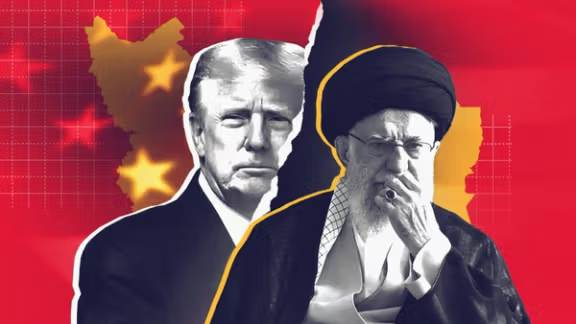
US advocacy group United Against Nuclear Iran (UANI) on Friday called on the United States to sanction Iran's Supreme Leader Ali Khamenei over fatwas from senior clerics which appear to call for the death of US President Donald Trump.
During a 12-day Iran-Israel war last month, Trump said Washington was aware of Khamenei's hiding place and mooted potentially green lighting the killing of Iran's head of state.
Days after the conflict ended, two top Shi'ite clerics Ayatollah Naser Makarem Shirazi and Ayatollah Hossein Nouri Hamedani issued religious decrees or fatwas condemning to death those who would threaten the Supreme Leader. The fatwas were cited by Alireza Panahian, a cleric close to Khamenei, to repeat the call for killing Trump.
“The Iranian regime’s medieval and barbaric threats against the US president and others cannot be ignored – and must not go unanswered,” UANI said in a written statement.
UANI called on the US government to put sanctions on the Iranian leader and his son and all who ordered or repeated such a religious decree.
Shirazi said in his statement: “Any regime or individual threatening the leaders of the Islamic nation and acting on those threats qualifies as a mohareb (enemy of God).”
In Shi'ite jurisprudence, the declaration of mohareb and the issuance of a fatwa make it religiously obligatory for devout Muslims to act.
“These calls are incitements to homegrown terrorist attacks and pose a serious threat to the president and US nationals—they should be treated accordingly,” UANI's statement said.
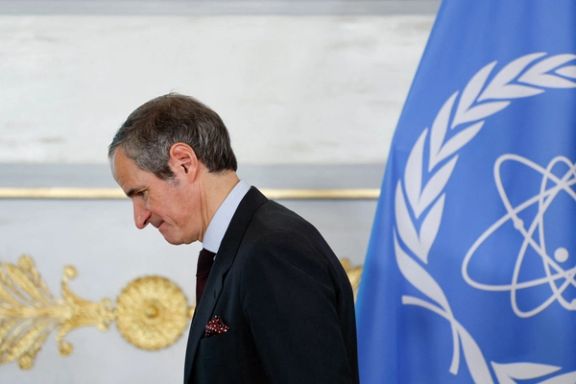
The International Atomic Energy Agency said on Friday that its team of inspectors had safely departed Iran to return to its headquarters in Vienna, after a new law barred cooperation with the UN body.
In a statement on X, the agency said Director General Rafael Grossi had “reiterated the crucial importance” of holding talks with Iranian authorities to resume the IAEA’s “indispensable” monitoring and verification work “as soon as possible.”
The inspectors had remained in Tehran throughout the 12-day conflict between Iran and Israel.
The announcement follows a report by the Wall Street Journal that the inspectors were pulled out over safety concerns and transported by road to Armenia in a departure coordinated with Iranian authorities.
Citing sources familiar with the matter, the newspaper reported that the agency had been trying to arrange the exit for several days and chose ground transport to reduce visibility and risk.
The move comes after weeks of rising tensions between Tehran and the UN nuclear watchdog. On Wednesday, Iranian President Masoud Pezeshkian enacted a law requiring the suspension of cooperation under the Nuclear Non-Proliferation Treaty’s safeguards agreement unless Iran’s demands for security guarantees are met.
Tehran has accused the IAEA of sharing sensitive data with Israel and the US, and of failing to condemn last month’s airstrikes on Iranian nuclear sites.
While Iran has denied ending cooperation entirely, Foreign Minister Abbas Araghchi said coordination with the agency would now be managed through Iran’s Supreme National Security Council.
This is while hardline Iranian media have called for Grossi's arrest and execution, and a senior judiciary official said Grossi could face trial in absentia for “deceptive actions.”
It remains unclear when or whether IAEA inspectors will return. WSJ reporter Laurence Norman said there is “no reason to feel confident” they will be back in Tehran anytime soon, adding that it could be years before monitoring operations resume.

White House envoy Steve Witkoff is planning to meet Iranian Foreign Minister Abbas Araghchi in Oslo next week to relaunch nuclear talks, Axios reported Thursday, citing two sources familiar with the preparations.
The meeting would mark the first direct engagement since President Donald Trump ordered strikes on Iran’s nuclear facilities last month.
"We have no travel announcements at this time," a White House official told Axios. The Iranian mission to the UN declined to comment.
The discussions, brokered with help from Omani and Qatari officials, follow a 12-day war between Israel and Iran that ended under a US-negotiated ceasefire. Witkoff and Araghchi have maintained contact during and since that conflict, the sources said.
Israel's Channel 12 first reported the planned meeting.
A key topic will be Iran’s growing stockpile of highly enriched uranium, including 400 kilograms enriched to 60%. US and Israeli officials say the material is currently inaccessible, sealed off by rubble at the bombed enrichment sites in Natanz, Fordow, and Isfahan.
Iran has since announced the suspension of all cooperation with the International Atomic Energy Agency, citing a law passed by its parliament.
In a post on X, Araghchi said Iran remained committed to its Safeguards Agreement and the Nuclear Non-Proliferation Treaty, but added that any coordination with the IAEA would now be managed through Iran’s Supreme National Security Council.
“In accordance with the new legislation... our cooperation with the IAEA will be channeled through Iran's Supreme National Security Council for obvious safety and security reasons,” he wrote.
Araghchi told CBS on Monday that talks with the United States are unlikely to resume soon, following US airstrikes on three major nuclear sites during the 12-day war with Israel.
“I don’t think negotiations will restart as quickly as that,” Araghchi said in his first interview with an American news outlet since the June airstrikes.
“We will have to first ensure that America will not revert to targeting us in a military attack during the negotiations.”
No final date for the Oslo meeting has been confirmed, and neither side has publicly acknowledged the planned talks.
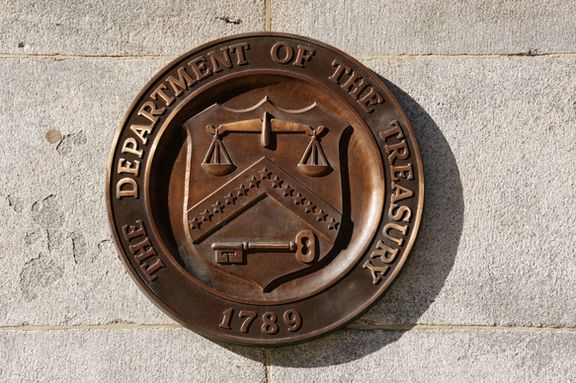
The US Treasury on Thursday sanctioned an international network smuggling billions of dollars in Iranian oil disguised as Iraqi.
The sanctions targeted companies linked to Iraqi-British businessman Salim Ahmed Said and expanding pressure on Iran’s petroleum trade and shadow fleet.
Said’s network, operating since at least 2020, used ship-to-ship transfers and forged documents to sell blended Iranian-Iraqi oil to global buyers, the Treasury said.
“Treasury will continue to target Tehran’s revenue sources and intensify economic pressure to disrupt the regime’s access to the financial resources that fuel its destabilizing activities,” said Secretary Scott Bessent.
The Treasury Department also sanctioned several vessels accused of secretly transporting Iranian oil, increasing pressure on Iran’s "shadow fleet," it said.
Several senior officials and one entity linked to the Iran-backed Hezbollah-controlled financial institution Al-Qard Al-Hassan was also targeted.
These officials conducted millions of dollars in transactions that ultimately benefited Hezbollah while concealing their involvement, according to the department.
This latest action, part of the US maximum pressure campaign on Iran, marks the eighth round of oil-trade-related sanctions since 2021.
All US-linked assets of the targeted entities are now frozen, and Americans are barred from dealings with them. The designations also expose foreign firms to secondary sanctions, heightening the cost of facilitating Iran’s oil trade.
